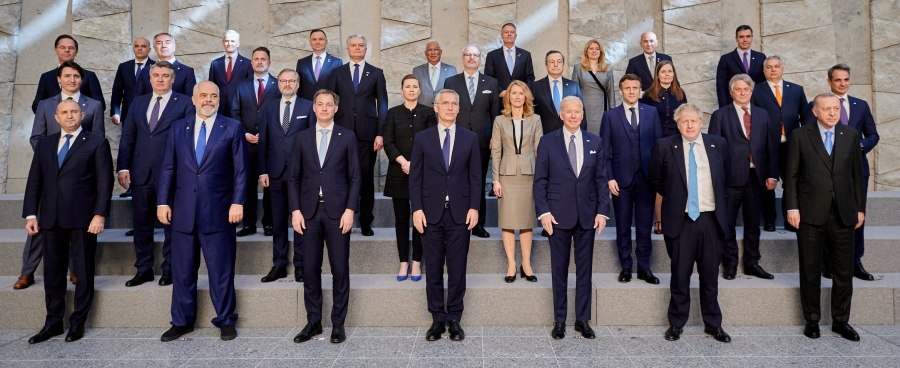An extraordinary gathering of world leaders is taking place in Belgium today, as members of the North Atlantic Treaty Organization gather to discuss their support for Ukraine and to continue to condemn Russia’s illegal invasion of the country.
Heads of state and government leaders from around the world gathered in Brussels for an emergency summit on Russia’s assault on Ukraine today, after the invasion began in late February. Members included Prime Minister Justin Trudeau, US President Joe Biden and a number of G7 leaders.
NATO members say Russia’s invasion is the ‘gravest threat to Euro-Atlantic security in decades’, and members are continuing to call on Russian President Vladimir Putin to withdraw his forces from Ukraine and for Belarus to end its complicity.
“Russia’s attack on Ukraine threatens global security,” wrote NATO leadership, in a prepared statement.
“Its assault on international norms makes the world less safe. President Putin’s escalatory rhetoric is irresponsible and destabilizing. We strongly condemn Russia’s devastating attacks on civilians, including women, children and persons in vulnerable situations.”
NATO’s Secretary-General, Jens Stoltenberg, warned members Thursday that Russia may be preparing to use chemical weapons in the war against Ukraine, and any use of chemical weapons would have ‘severe consequences’.
Stoltenberg adds that NATO has committed to sending protective equipment for chemical, biological and nuclear attacks, if that worst-case scenario were to happen.
“President Putin’s choice to attack Ukraine is a strategic mistake, with grave consequences also for Russia and the Russian people. We remain united and resolute in our determination to oppose Russia’s aggression, aid the government and the people of Ukraine, and defend the security of all Allies,” adds NATO.
193 members voted overwhelmingly in favour of a new resolution calling for civilian protections and more supports in Ukraine, drafted by the Ukrainian government. The only votes against the motion included those from Russia, Syria, North Korea, Eritrea and Belarus.
NATO members also agreed to provide more troops to Ukraine’s eastern flank, with additional battlegroups in Bulgaria, Hungary, Romania and Slovakia. Those troops will join with the four multinational battlegroups already operating in the region.
“Our government needs to do more,” said Kenora MP Eric Melillo, while speaking on the situation in Ukraine after Canada’s Parliament met with Ukrainian President Volodymyr Zelensky on March 14.
“Obviously, any action we take, especially regarding military support, must be in concert with our NATO allies. The government must seriously consider more actions such as expelling the Russian ambassador and protecting the airspace above humanitarian corridors,” adds Melillo.
NATO has said they will not move to enforce a no-fly zone over Ukraine, once again requested by Ukrainian President Zelensky during the summit, as members fear the move could trigger war across much of Europe.
“I have been repeating the same thing for a month now. To save people and our cities, Ukraine needs military assistance – without restrictions,” said Zelensky, in his address to NATO members at the summit.
“As without restrictions, Russia is using its entire arsenal against us. [NATO] has a chance to show that this is truly the most powerful defence association in the world,” Zelensky said, warning ‘the world is watching.’
Russia’s illegal invasion began on February 24, which has continued to threaten the independence of 44 million Ukrainian residents. Relations between the two countries have been hostile since the invasion and annexation of Crimea in 2014.
The United Nations has estimated that at least 977 civilians have been killed and 1,594 have been injured, but warned the true amount is likely much higher. As well, UN’s refugee agency says over 3.6 million Ukrainians have fled to neighbouring countries and over 10 million have fled their homes.
NATO officials have estimated that between 7,000 and 15,000 Russian troops have been killed since the invasion began. NATO includes military representation from 30 countries around the world. The organization was established in the aftermath of World War II in 1949.
Melillo noted he is still one of 300 Canadians on Russia’s ‘blacklist’ for condemning Putin’s invasion, which was published in response to Canada’s sanctions against Russia’s elites and businesses.
“The Russian government banned many Canadians including myself and the majority of MP’s from entering their country. This certainly isn’t going to deter us from continuing to support Ukraine. In fact, I view it as a badge of honour for standing up for peace and democracy,” Melillo adds.
Canada’s sanctions aim to ‘disconnect’ Russia’s financial institutions from the rest of the world’s economy, to place financial penalties against individuals, to restrict Russia’s exports and to impose steep tariffs on its imports. More sanctions were announced by the US after NATO’s morning meeting.
